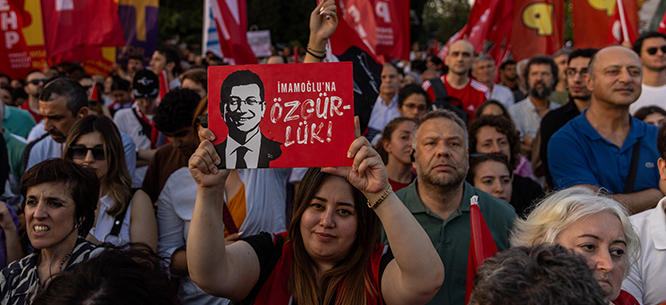Turkiye has issued Israel arrest warrants for 37 senior officials. They are all accused of genocide and crimes against humanity. This comes in response to the Israeli occupation’s military operation in Gaza.
Senior Israeli occupation officials have no place to hide
Only five of the officials have been named. They are war criminal Netanyahu, far-right National Security Minister Itamar Ben-Gvir, Defence Minister Israel Katz, Israeli occupation forces (IOF) Border and Security Minister Eyal Zamir, and Naval Forces Commander David Salama.
The charges stem from allegations that the IOF has waged “systematic violence against civilians in Gaza”. Infrastructure has been intentionally destroyed, and humanitarian aid has been blocked, while medical assistance has been denied.
Turkish prosecutors cited specific targeted attacks in Gaza, between October 2023 and March 2025. These included the devastating attack on the Al-Ahli Arab Baptist Hospital on October 17, 2023, in which more than 470 people were massacred and 340 injured, from an explosion in the hospital car park. The Israeli regime blamed the incident on a failed rocket launch by Hamas, and continues to do so today. But according to analysis by Forensic Architecture there was a campaign of disinformation from the Israeli occupation forces about the incident.
The prosecutors also refer to the “Turkish-Palestinian Friendship Hospital”. This was built by Turkiye, and was the only cancer hospital in Gaza. It was bombed in March of this year, after ‘Israel’ claimed again, without any evidence, that the hospital was being used by Hamas.
They also referenced the killing of seven aid workers from the World Central Kitchen on April 1, 2024. All three vehicles were clearly marked with their logo, even on the roof, and their route had been agreed upon with the IOF beforehand. But they were targeted by Israeli precision drone strikes, and were killed.
Israel arrest warrants — regime calls it a ‘PR stunt’
The Foreign Minister for the Israeli regime, Gideon Saar has dismissed the announcement of the charges by calling them “the latest PR stunt by the tyrant Erdogan.” Even though Saar is deeply complicit in Gaza’s genocide, the UK government actively shielded him from arrest during a visit to Britain earlier this year.
Hamas has welcomed the decision by Turkiye to issue the arrest warrants. In a statement, the resistance group said:
We call on all countries worldwide, and their judicial bodies, to issue legal warrants to pursue the terrorist Zionist occupation leaders everywhere, and work to bring them to court, and hold them accountable for their crimes against humanity.
Turkiye has been a vocal critic of the genocide in Gaza, and suspended diplomatic and trade relations with Israel over the conflict. But the country has a long history of diplomatic relations with the Israeli regime. It was the first Muslim majority country to officially recognize the Israeli regime in 1949. For decades, the two countries cooperated in areas such as trade, military, and intelligence. In the 1990s and early 2000s, security and economic ties deepened between the two and, in 2006, the Israeli occupation’s Foreign Ministry described its country’s relationship with Turkiye as “perfect”.
In 2010 ‘Israel’ killed 10 Turkish activists
Relations started to strain following Turkiye’s condemnation of Operation Cast Lead. Israeli occupation’s devastating 22 day military assault on Gaza in 2008, killed almost 1390 Palestinians, wounded 5000, and obliterated much of Gaza’s infrastructure. Relations deteriorated further after the 2010 Gaza Flotilla incident, where Israeli occupation forces raided the Turkish-owned aid ship Mavi Marmara in international waters, killing 10 Turkish activists. The boat was attempting to break the occupation’s blockade on Gaza. This led to a sharp diplomatic break and the suspension of military ties.
Trump’s 20 Point Plan for Gaza states that an International Stabilisation Force (ISF) will soon be deployed to Gaza. Its task would be to oversee the ‘ceasefire’, and provide security in Gaza. It would oversee aid distribution, train a Palestinian police force and also ensure that Hamas hands over its weapons. The US wants Islamic and Arab states to contribute with funding and troops. Turkey says it will commit to the ISF, and Gaza’s reconstruction. But the Israeli regime insists that any foreign troops deployed in Gaza must have its approval, and says any Turkish military presence in Gaza is unacceptable.
Israel arrest warrants — Countries have a legal obligation
History shows us a pattern of cooperation and confrontation between Turkiye and ‘Israel’, but Turkiye is now pursuing legal measures. The country wants to challenge Israeli’s impunity for war crimes. The decision also places renewed pressure on other governments. Those who have remained silent or complicit — failing their obligations under international law.
As the warrants set a new precedent, Turkiye’s move challenges the longstanding impunity that Israeli occupation officials have enjoyed on the world stage. More countries must act. Rather than countries such as the UK shielding criminal Israeli occupation officials, arrest warrants must continue to be issued. All ties must also be cut with the regime. Foreign Minister Gideon Saar, has told us that ‘Israel’ will be destroyed if it suffers from an arms embargo. But we need to ensure diplomatic, economic, academic and cultural boycotts take place as well.
Under international law, every country has a moral and legal obligation to prevent genocide, and stop it happening. It is time we fulfilled our obligations and held the Israeli occupation to account for its many crimes.
By Charlie Jaay
This post was originally published on Canary.
 (@Leonardo_UK)
(@Leonardo_UK) 




